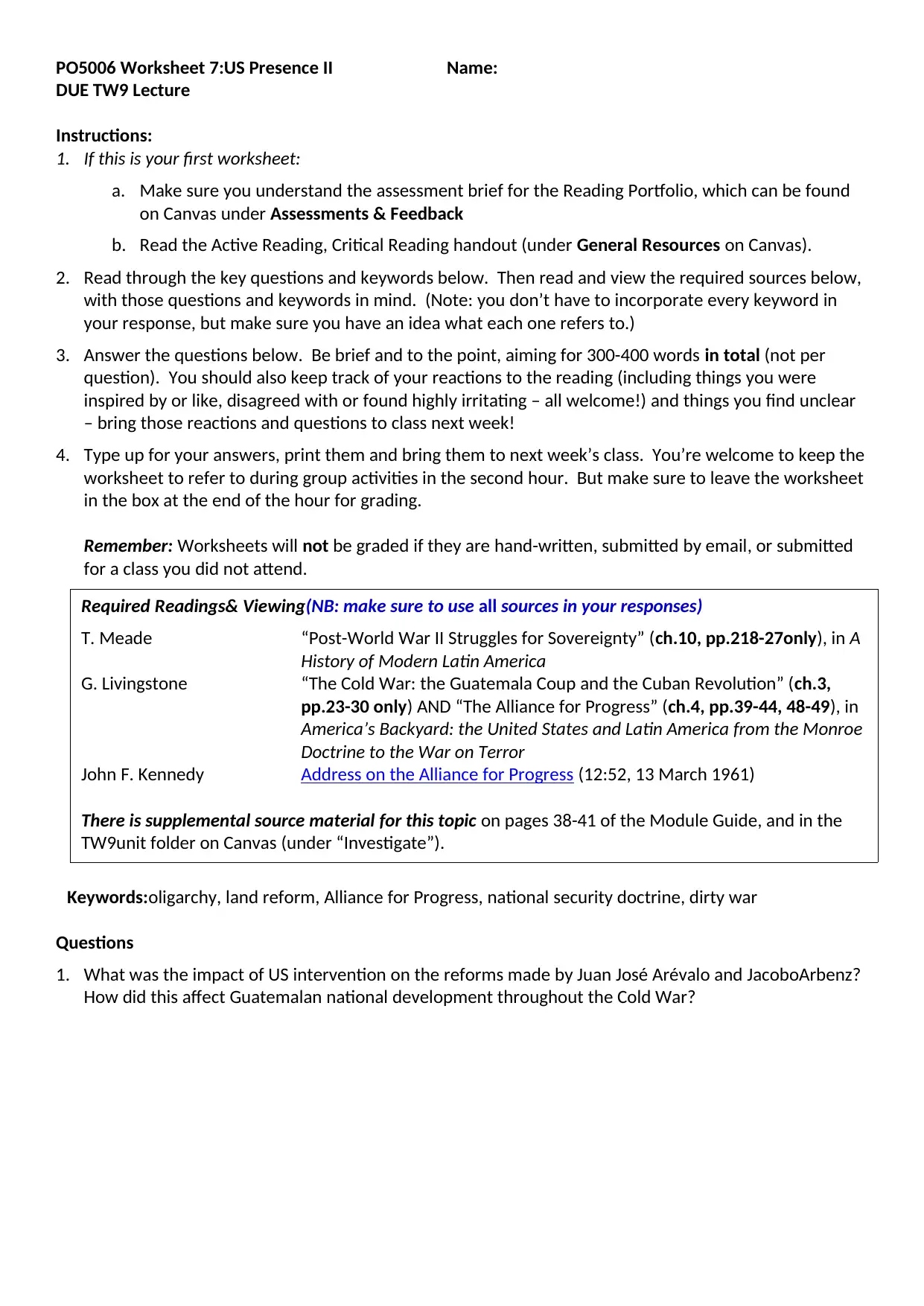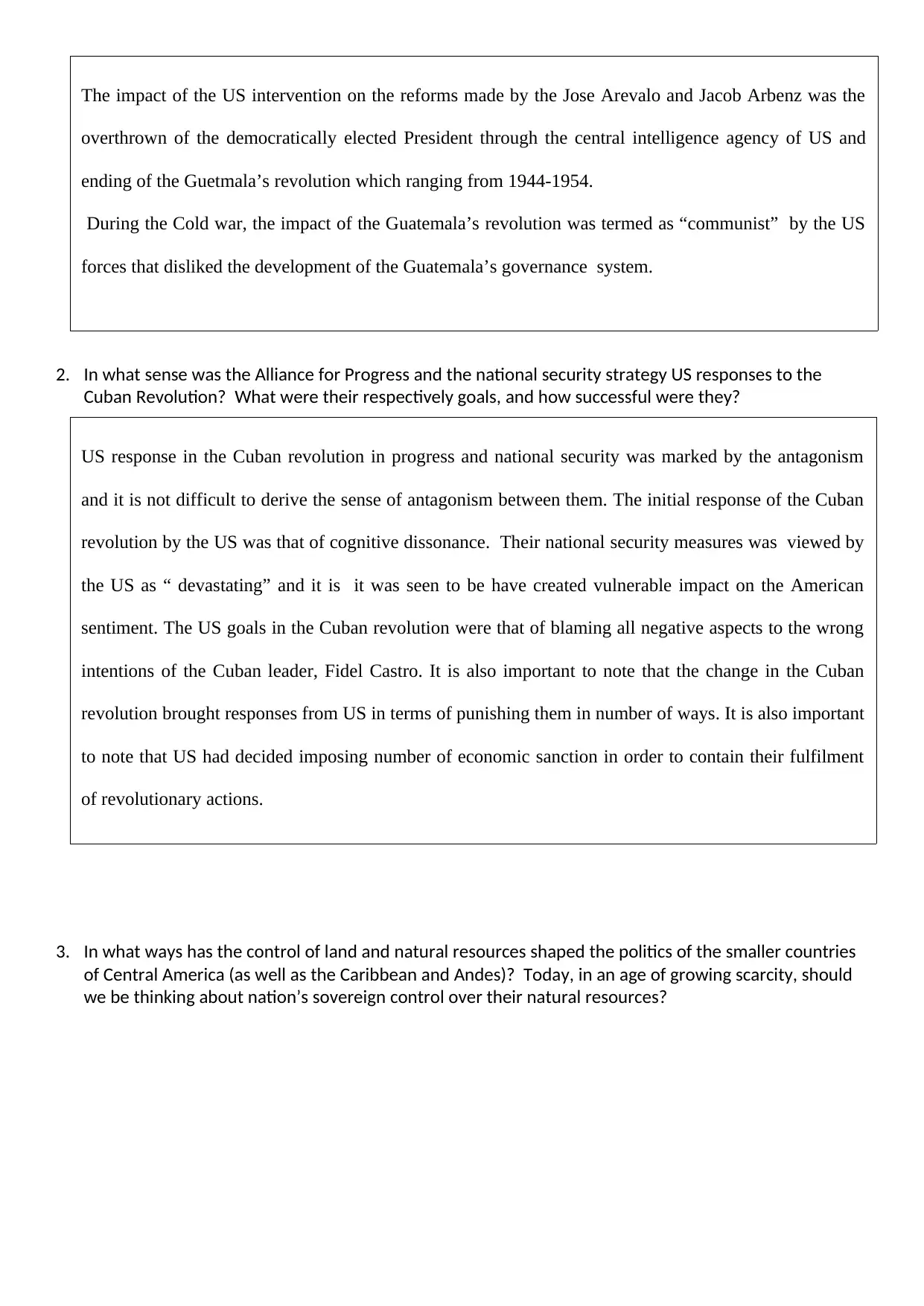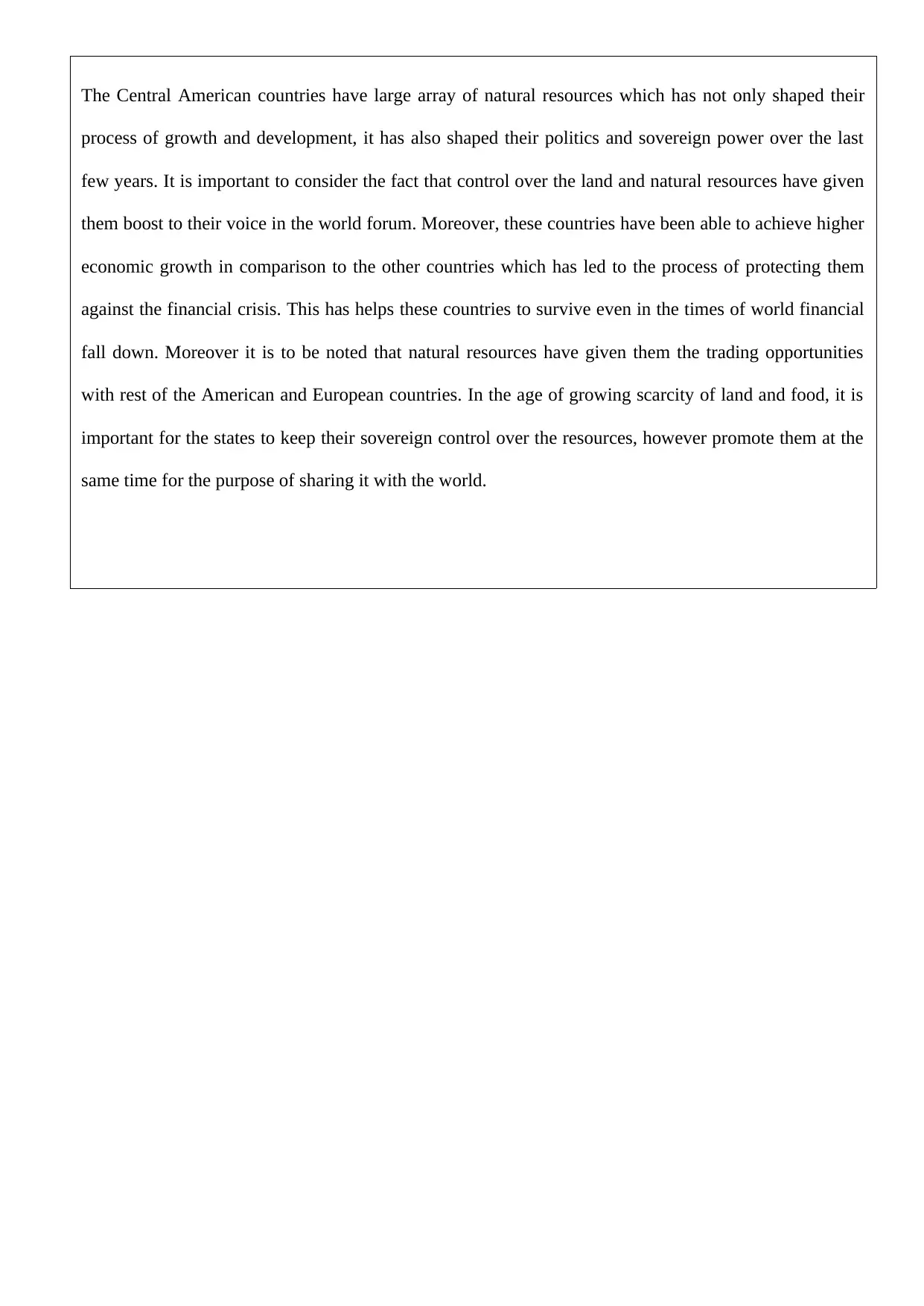PO5006 Worksheet 7: US Presence II - Cold War & Latin America
VerifiedAdded on 2022/11/26
|3
|961
|447
Homework Assignment
AI Summary
This worksheet, PO5006 Worksheet 7: US Presence II, delves into the impact of US intervention in Latin America, particularly during the Cold War era. It examines the consequences of US involvement in the Guatemalan revolution, the overthrow of democratically elected leaders, and the impact on national development. The assignment explores the Alliance for Progress and the national security strategy as responses to the Cuban Revolution, analyzing their goals and success. Furthermore, it investigates how the control of land and natural resources has shaped the politics of Central American countries and discusses the importance of national sovereign control over these resources in an age of growing scarcity. The worksheet requires students to use provided sources, answer questions concisely, and consider their reactions to the readings.

PO5006 Worksheet 7:US Presence II Name:
DUE TW9 Lecture
Instructions:
1. If this is your first worksheet:
a. Make sure you understand the assessment brief for the Reading Portfolio, which can be found
on Canvas under Assessments & Feedback
b. Read the Active Reading, Critical Reading handout (under General Resources on Canvas).
2. Read through the key questions and keywords below. Then read and view the required sources below,
with those questions and keywords in mind. (Note: you don’t have to incorporate every keyword in
your response, but make sure you have an idea what each one refers to.)
3. Answer the questions below. Be brief and to the point, aiming for 300-400 words in total (not per
question). You should also keep track of your reactions to the reading (including things you were
inspired by or like, disagreed with or found highly irritating – all welcome!) and things you find unclear
– bring those reactions and questions to class next week!
4. Type up for your answers, print them and bring them to next week’s class. You’re welcome to keep the
worksheet to refer to during group activities in the second hour. But make sure to leave the worksheet
in the box at the end of the hour for grading.
Remember: Worksheets will not be graded if they are hand-written, submitted by email, or submitted
for a class you did not attend.
Required Readings& Viewing(NB: make sure to use all sources in your responses)
T. Meade “Post-World War II Struggles for Sovereignty” (ch.10, pp.218-27only), in A
History of Modern Latin America
G. Livingstone “The Cold War: the Guatemala Coup and the Cuban Revolution” (ch.3,
pp.23-30 only) AND “The Alliance for Progress” (ch.4, pp.39-44, 48-49), in
America’s Backyard: the United States and Latin America from the Monroe
Doctrine to the War on Terror
John F. Kennedy Address on the Alliance for Progress (12:52, 13 March 1961)
There is supplemental source material for this topic on pages 38-41 of the Module Guide, and in the
TW9unit folder on Canvas (under “Investigate”).
Keywords:oligarchy, land reform, Alliance for Progress, national security doctrine, dirty war
Questions
1. What was the impact of US intervention on the reforms made by Juan José Arévalo and JacoboArbenz?
How did this affect Guatemalan national development throughout the Cold War?
DUE TW9 Lecture
Instructions:
1. If this is your first worksheet:
a. Make sure you understand the assessment brief for the Reading Portfolio, which can be found
on Canvas under Assessments & Feedback
b. Read the Active Reading, Critical Reading handout (under General Resources on Canvas).
2. Read through the key questions and keywords below. Then read and view the required sources below,
with those questions and keywords in mind. (Note: you don’t have to incorporate every keyword in
your response, but make sure you have an idea what each one refers to.)
3. Answer the questions below. Be brief and to the point, aiming for 300-400 words in total (not per
question). You should also keep track of your reactions to the reading (including things you were
inspired by or like, disagreed with or found highly irritating – all welcome!) and things you find unclear
– bring those reactions and questions to class next week!
4. Type up for your answers, print them and bring them to next week’s class. You’re welcome to keep the
worksheet to refer to during group activities in the second hour. But make sure to leave the worksheet
in the box at the end of the hour for grading.
Remember: Worksheets will not be graded if they are hand-written, submitted by email, or submitted
for a class you did not attend.
Required Readings& Viewing(NB: make sure to use all sources in your responses)
T. Meade “Post-World War II Struggles for Sovereignty” (ch.10, pp.218-27only), in A
History of Modern Latin America
G. Livingstone “The Cold War: the Guatemala Coup and the Cuban Revolution” (ch.3,
pp.23-30 only) AND “The Alliance for Progress” (ch.4, pp.39-44, 48-49), in
America’s Backyard: the United States and Latin America from the Monroe
Doctrine to the War on Terror
John F. Kennedy Address on the Alliance for Progress (12:52, 13 March 1961)
There is supplemental source material for this topic on pages 38-41 of the Module Guide, and in the
TW9unit folder on Canvas (under “Investigate”).
Keywords:oligarchy, land reform, Alliance for Progress, national security doctrine, dirty war
Questions
1. What was the impact of US intervention on the reforms made by Juan José Arévalo and JacoboArbenz?
How did this affect Guatemalan national development throughout the Cold War?
Paraphrase This Document
Need a fresh take? Get an instant paraphrase of this document with our AI Paraphraser

The impact of the US intervention on the reforms made by the Jose Arevalo and Jacob Arbenz was the
overthrown of the democratically elected President through the central intelligence agency of US and
ending of the Guetmala’s revolution which ranging from 1944-1954.
During the Cold war, the impact of the Guatemala’s revolution was termed as “communist” by the US
forces that disliked the development of the Guatemala’s governance system.
2. In what sense was the Alliance for Progress and the national security strategy US responses to the
Cuban Revolution? What were their respectively goals, and how successful were they?
US response in the Cuban revolution in progress and national security was marked by the antagonism
and it is not difficult to derive the sense of antagonism between them. The initial response of the Cuban
revolution by the US was that of cognitive dissonance. Their national security measures was viewed by
the US as “ devastating” and it is it was seen to be have created vulnerable impact on the American
sentiment. The US goals in the Cuban revolution were that of blaming all negative aspects to the wrong
intentions of the Cuban leader, Fidel Castro. It is also important to note that the change in the Cuban
revolution brought responses from US in terms of punishing them in number of ways. It is also important
to note that US had decided imposing number of economic sanction in order to contain their fulfilment
of revolutionary actions.
3. In what ways has the control of land and natural resources shaped the politics of the smaller countries
of Central America (as well as the Caribbean and Andes)? Today, in an age of growing scarcity, should
we be thinking about nation’s sovereign control over their natural resources?
overthrown of the democratically elected President through the central intelligence agency of US and
ending of the Guetmala’s revolution which ranging from 1944-1954.
During the Cold war, the impact of the Guatemala’s revolution was termed as “communist” by the US
forces that disliked the development of the Guatemala’s governance system.
2. In what sense was the Alliance for Progress and the national security strategy US responses to the
Cuban Revolution? What were their respectively goals, and how successful were they?
US response in the Cuban revolution in progress and national security was marked by the antagonism
and it is not difficult to derive the sense of antagonism between them. The initial response of the Cuban
revolution by the US was that of cognitive dissonance. Their national security measures was viewed by
the US as “ devastating” and it is it was seen to be have created vulnerable impact on the American
sentiment. The US goals in the Cuban revolution were that of blaming all negative aspects to the wrong
intentions of the Cuban leader, Fidel Castro. It is also important to note that the change in the Cuban
revolution brought responses from US in terms of punishing them in number of ways. It is also important
to note that US had decided imposing number of economic sanction in order to contain their fulfilment
of revolutionary actions.
3. In what ways has the control of land and natural resources shaped the politics of the smaller countries
of Central America (as well as the Caribbean and Andes)? Today, in an age of growing scarcity, should
we be thinking about nation’s sovereign control over their natural resources?

The Central American countries have large array of natural resources which has not only shaped their
process of growth and development, it has also shaped their politics and sovereign power over the last
few years. It is important to consider the fact that control over the land and natural resources have given
them boost to their voice in the world forum. Moreover, these countries have been able to achieve higher
economic growth in comparison to the other countries which has led to the process of protecting them
against the financial crisis. This has helps these countries to survive even in the times of world financial
fall down. Moreover it is to be noted that natural resources have given them the trading opportunities
with rest of the American and European countries. In the age of growing scarcity of land and food, it is
important for the states to keep their sovereign control over the resources, however promote them at the
same time for the purpose of sharing it with the world.
process of growth and development, it has also shaped their politics and sovereign power over the last
few years. It is important to consider the fact that control over the land and natural resources have given
them boost to their voice in the world forum. Moreover, these countries have been able to achieve higher
economic growth in comparison to the other countries which has led to the process of protecting them
against the financial crisis. This has helps these countries to survive even in the times of world financial
fall down. Moreover it is to be noted that natural resources have given them the trading opportunities
with rest of the American and European countries. In the age of growing scarcity of land and food, it is
important for the states to keep their sovereign control over the resources, however promote them at the
same time for the purpose of sharing it with the world.
⊘ This is a preview!⊘
Do you want full access?
Subscribe today to unlock all pages.

Trusted by 1+ million students worldwide
1 out of 3
Your All-in-One AI-Powered Toolkit for Academic Success.
+13062052269
info@desklib.com
Available 24*7 on WhatsApp / Email
![[object Object]](/_next/static/media/star-bottom.7253800d.svg)
Unlock your academic potential
Copyright © 2020–2026 A2Z Services. All Rights Reserved. Developed and managed by ZUCOL.

